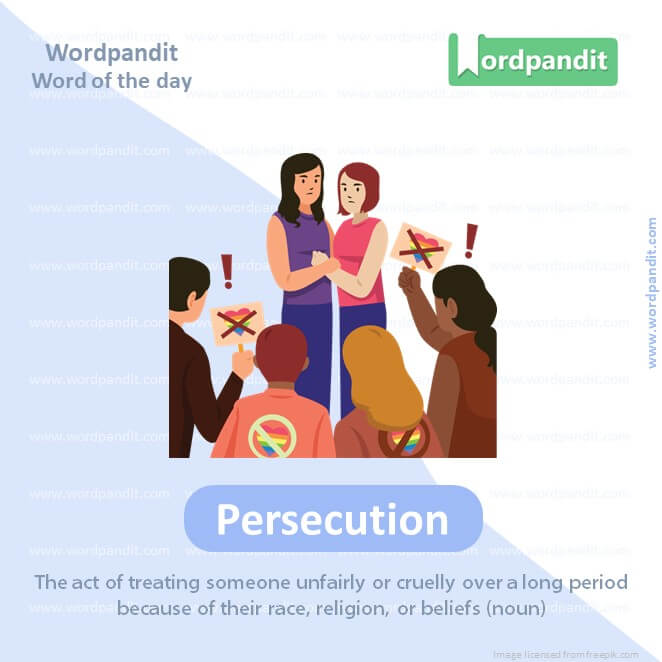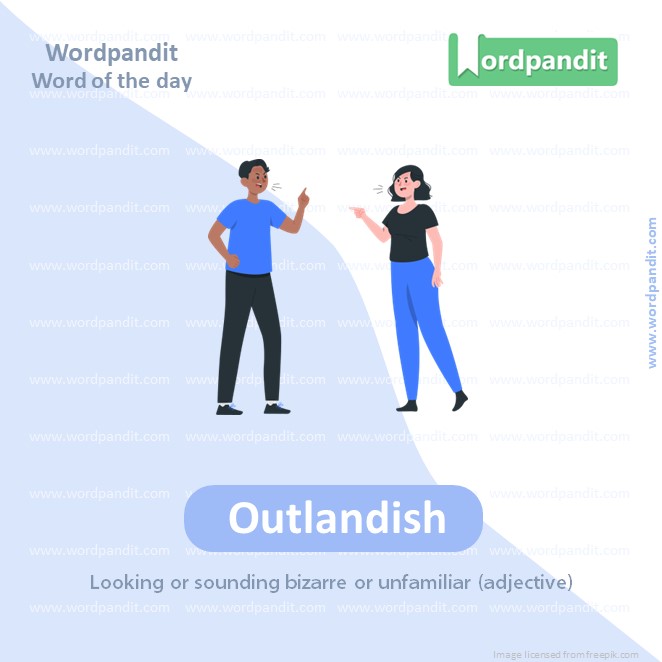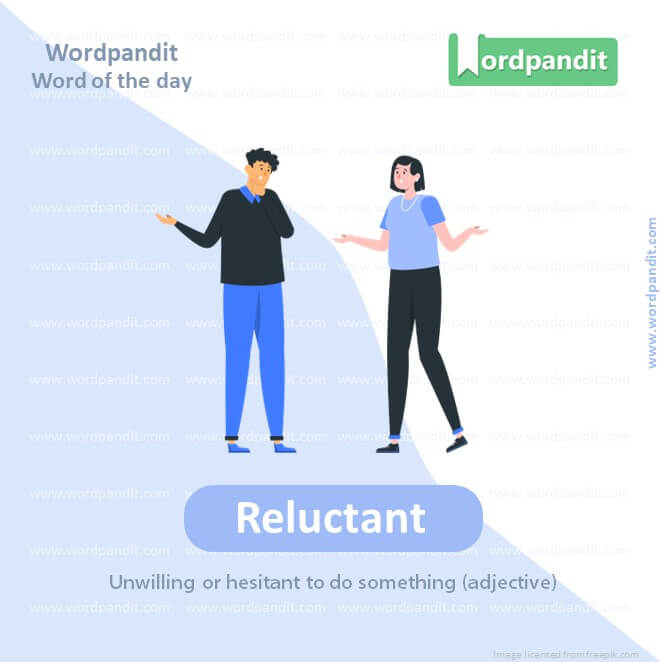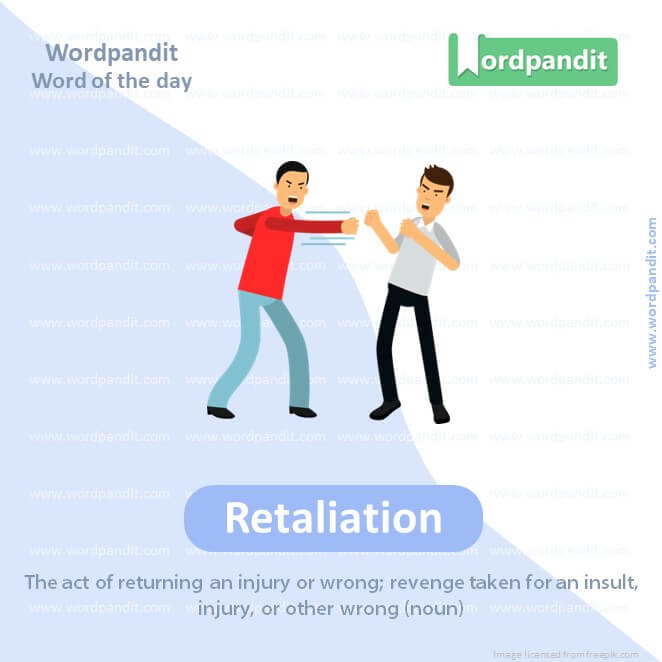Daily Vocabulary Words: List of Daily Used Words in Leading International Newspapers
Hi there. Welcome to this special section @ Wordpandit.
Our endeavour here is very simple: to highlight important daily vocabulary words, which you would come across in leading newspapers in the country. We have included the following newspapers in our selection:
• The New York Times
• The Washington Post
• Scientific American
• BBC
• The Guardian
• Psychology Today
• Wall Street Journal
• The Economist
We are putting in extensive work for developing your vocabulary. All you have got to do is be regular with this section and check out this post on a daily basis. This is your repository of words that are commonly used and essentially, we are posting a list of daily used words. Hence, this has significant practical application as it teaches you words that are used commonly in leading publications mentioned above.
Visit the website daily to learn words from leading international newspapers.

WORD-1: Persecution
Context: Has received much attention in recent years, but no international tribunal has ever held that this kind of persecution violates international law.
Source: New York Times
Explanatory Paragraph: Think about a time when someone kept bothering you, again and again, making you feel sad or scared because they didn’t like something about you. That’s like persecution. It’s when someone is treated very badly and unfairly over and over because of who they are or what they believe.
Meaning: The act of treating someone unfairly or cruelly over a long period
because of their race, religion, or beliefs (noun)
Pronunciation: per-suh-KYOO-shun
Synonyms: oppression, harassment, victimization, mistreatment, abuse
Usage Examples:
1. The persecution of minority groups in the country has drawn international condemnation.
2. She spoke out against the persecution faced by refugees.
3. The history lesson covered the persecution of witches in the 16th century.
4. They fled their homeland due to religious persecution.
WORD-2: Flagging
Context: The Russian leader embraced a so-called gay propaganda law passed in 2013 to help shore up his flagging popularity at home, part of a rebrand of his political persona as a champion of the Orthodox Church, and a Kremlin ally backed an anti-L.G.B.T.Q. campaign in Ukraine to try to drive the country away from closer ties with the European Union.
Source: New York Times
Explanatory Paragraph: Imagine you’re running really fast at the start, but after a while, you start feeling tired and slow down. That slowing down is like flagging. It’s when someone or something starts to get tired or less energetic.
Meaning: Showing sustained enthusiastic action with unflagging vitality
(adjective)
Pronunciation: FLA-ging
Synonyms: weakening, dwindling, fading, waning, ebbing
Usage Examples:
1. By the end of the marathon, the runner’s energy was flagging.
2. The flagging interest in the show led to its cancellation.
3. She took a coffee break to combat her flagging concentration.
4. The team’s flagging spirits were lifted by the unexpected victory.
WORD-3: Ravings
Context: A chance to dismiss concerns about human rights and pluralism as the ravings of Western degenerates.
Source: New York Times
Explanatory Paragraph: Think about a time when someone was talking really loudly and saying things that didn’t make much sense, maybe like they were telling a strange story from a dream. That’s called ravings. It’s when people say things that are crazy or very excited and don’t seem logical.
Meaning: Wild, incoherent, and often excited speech or writing (noun).
Pronunciation: RAY-vings
Synonyms: babblings, rantings, ramblings, delirium, hysteria
Usage Examples:
1. The fever made him delirious, and he began uttering ravings that made no sense.
2. The novel features a character known for her wild ravings.
3. Critics dismissed his speech as the ravings of a madman.
4. Her ravings were ignored as she was thought to be under stress.

WORD-4: Outlandish
Context: Russian state media spread outlandish stories about L.G.B.T.Q.
Source: New York Times
Explanatory Paragraph: Imagine seeing someone wearing a costume that is really different and strange, like a mix of a dinosaur and a space alien. That’s outlandish. It means something looks or sounds very unusual and strange, not like what we see every day.
Meaning: Looking or sounding bizarre or unfamiliar (adjective).
Pronunciation: out-LAN-dish
Synonyms: bizarre, strange, weird, eccentric, unconventional
Usage Examples:
1. He always wears outlandish outfits that make him stand out in a crowd.
2. The movie’s plot was so outlandish that it was hard to believe.
3. She has an outlandish sense of humor that not everyone understands.
4. The artist is known for her outlandish performances.
WORD-5: Unhinged
Context: Mr. Putin himself sounded increasingly unhinged as his invasion bogged down, describing the attack on Ukraine as a holy war against the West’s “reverse religion of real Satanism” in a September 2022 speech announcing that Russia would annex Kherson and three other regions.
Source: New York Times
Explanatory Paragraph: Think about a door that comes off its hinges and swings crazily. When we say someone is unhinged, it’s like their mind is not attached properly anymore, and they act in wild or unpredictable ways.
Meaning: Mentally unbalanced; deranged (adjective).
Pronunciation: un-HINGED
Synonyms: deranged, insane, mad, crazy, unstable
Usage Examples:
1. The loss of his job left him feeling completely unhinged.
2. Her unhinged behavior was a cause for concern among her friends.
3. The character in the thriller was an unhinged villain.
4. After the incident, his public speeches became more unhinged.
WORD-6: Conflating
Context: Actions are “a different story” from Mr. Putin’s rhetoric surrounding the war in Ukraine and that conflating the two would be like “trying to put separate stories into one basket.”
Source: New York Times
Explanatory Paragraph: Imagine if you put two different playdough colors together and squished them into one big ball. Conflating is like that, but with ideas or stories, where you mix them up and treat them as if they are the same thing.
Meaning: Combining two or more things into one, often incorrectly or misleadingly (verb).
Pronunciation: kun-FLAY-ting
Synonyms: merging, blending, fusing, mixing, amalgamating
Usage Examples:
1. You are conflating two separate issues that need to be discussed independently.
2. The article was criticized for conflating facts with opinions.
3. In his speech, he conflated history with his own interpretations.
4. There is a danger of conflating love and obsession in such discussions.

WORD-7: Reluctant
Context: Prosecuting gender-based violence is often challenging because victims may be reluctant to come forward.
Source: New York Times
Explanatory Paragraph: Think about when you don’t want to go to bed because you’re not feeling sleepy or you want to keep playing. That feeling of not wanting to do something is being reluctant. It means you’re not really eager or willing to do it.
Meaning: Unwilling or hesitant to do something (adjective)
Pronunciation: ruh-LUK-tuhnt
Synonyms: hesitant, unwilling, disinclined, averse, resistant
Usage Examples:
1. She was reluctant to leave the party because she was having so much fun.
2. Despite his reluctance, he agreed to help with the project.
3. The reluctant puppy refused to go out in the rain.
4. They were reluctant to make the decision without more information.

WORD-8: Retaliation
Context: If they have left the region and are somewhere safe to come out, there are risks of retaliation against extended family at home.
Source: New York Times
Explanatory Paragraph: Imagine if someone took your toy, and then you took theirs to get back at them. Retaliation is when you do something to someone because they did something to you first, like a way of getting even.
Meaning: The act of returning an injury or wrong; revenge taken for an insult,
injury, or other wrong (noun)
Pronunciation: ree-tal-ee-AY-shun
Synonyms: revenge, retribution, vengeance, reprisal, payback
Usage Examples:
1. The company’s decision was seen as retaliation for the employee’s previous complaints.
2. He warned against the dangers of escalation in military retaliation.
3. The strike was organized in retaliation for the unfair layoffs.
4. She denied that her actions were motivated by retaliation.

WORD-9: Acquaintance
Context: You couldn’t be sure what could you handle yourself under torture — how could you be sure about your acquaintance?
Source: New York Times
Explanatory Paragraph: Think about a person you know, but not very well, like someone you say hi to at school but don’t really play with. That person is called an acquaintance. It’s someone you know a little bit but they are not your close friend.
Meaning: People one knows slightly, but who are not close friends (noun).
Pronunciation: uh-KWAYN-tuhns
Synonyms: associate, contact, connection, colleague, companion
Usage Examples:
1. I ran into an old acquaintance from college at the supermarket.
2. She has a wide circle of acquaintances in the industry.
3. Our friendship started when we were mere acquaintances at work.
4. He’s more of an acquaintance than a friend, really.
WORD-10: Accusations
Context: The court pursues these accusations against Russian forces for violence against L.G.B.T.Q.
Source: New York Times
Explanatory Paragraph: Imagine telling the teacher that your friend took your pencil when they didn’t. That’s making an accusation. It’s when you say someone did something wrong or bad, sometimes without having proof.
Meaning: Claims that someone has done something wrong or illegal (noun).
Pronunciation: ak-yoo-ZAY-shunz
Synonyms: charges, allegations, assertions, claims, indictments
Usage Examples:
1. The accusations against the politician caused a huge scandal.
2. He faced accusations of theft and dishonesty.
3. She denied all the accusations made by her coworkers.
4. The trial was based on false accusations and insufficient evidence.
Vocabulary Daily Words
Among the myriad aspects of language learning, the role of ‘vocabulary daily words’ attests to their undeniable importance. These everyday words form the bedrock of communication. Whether used in casual chat or formal discussion, the fluency and understanding of ‘vocabulary daily words’ can significantly uplift the quality of interaction. However, the vital question is, how to effectively learn these ‘vocabulary daily words’?
The crux of learning ‘vocabulary daily words’ lies in a well-rounded approach that encompasses exposure, understanding, memorization, and practice. Rote memorization might seem like a quick solution, but it lacks context and, thereby, retention. Hence, opt for a diverse range of resources like books, newspapers, podcasts, and digital media. These will bring ‘vocabulary daily words’ to life, providing real-life usage examples and making the learning process inherently engaging.
Next, using memory-enhancing techniques can significantly improve retention of ‘vocabulary daily words’. Techniques such as flashcards or the Leitner System align with the principles of spaced repetition, allowing more effective and long-term learning. Incorporating mnemonic devices, associating new words with unique stories or images, can further facilitate this learning process.
The key to fully grasping ‘vocabulary daily words’ lies in practical usage. Make it a habit to use these words in your daily communications. Whether it’s a friendly conversation, a professional email, or a social media post, try integrating these new words. Doing so provides hands-on practice, strengthening your comprehension and application of these words.
In a nutshell, ‘vocabulary daily words’ are a treasure in the language learning landscape. By harnessing diversified resources, utilizing memory techniques, and actively using these words, your grip on the ‘vocabulary daily words’ will strengthen significantly. So, turn the pages, hit play, start a conversation, and let these ‘vocabulary daily words’ shape the story of your linguistic journey.











